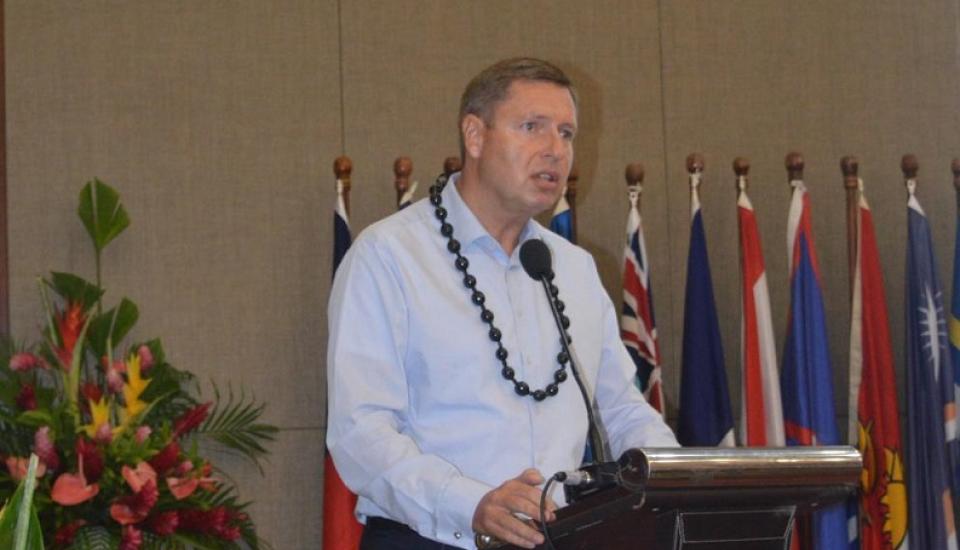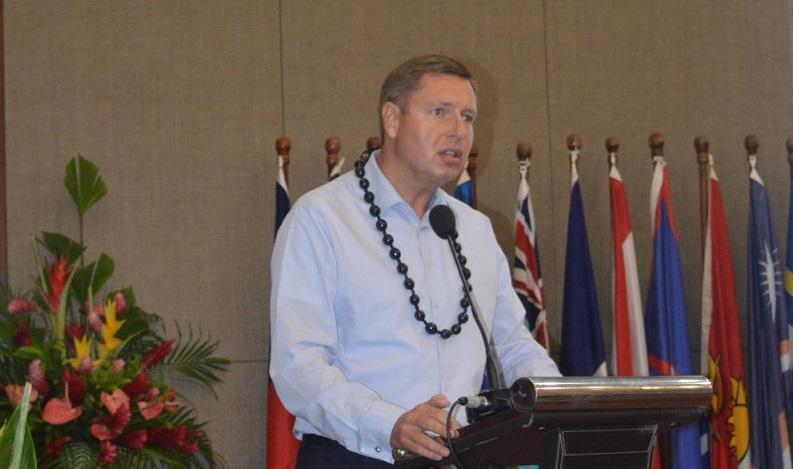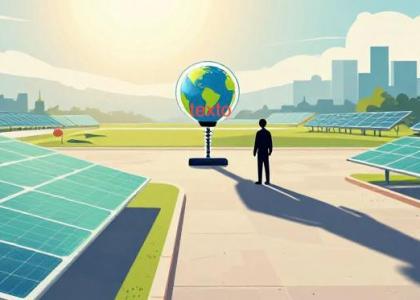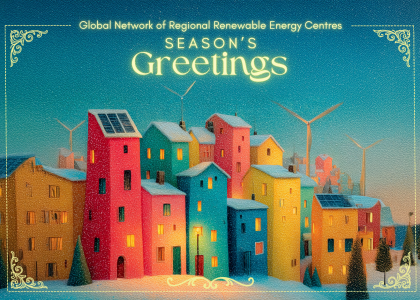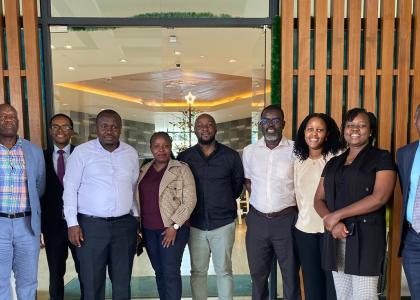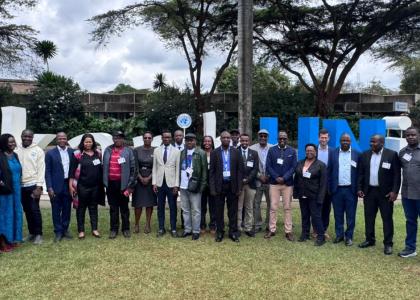Fourth Pacific Regional Energy and Transport Ministers’ Meeting
Opening Remarks by Mr. Stein Hansen, Director and UNIDO Representative Regional Office Hub in Bangkok
19 September 2019
TATTE Conference Centre, Apia, Samoa, 16-20 September 2019
Theme: Sustainable Energy and Transport Services for the Blue Pacific
Excellences,
Honorable Ministers,
Distinguished Delegates,
Ladies and Gentlemen,
Talofa!
Five years after my first visit to Samoa for the Third International SIDS Conference in 2014, it is a great honor for me, to be back in beautiful Samoa for the third time, representing UNIDO at this 4th Pacific Regional Energy and Transport Ministers’ Meeting. It takes place right before the UN Climate Action Summit, the SDG Summit and the SAMOA Pathway Midterm Review in New York next week. It is obvious, that we need enhanced joined efforts to implement the 2030 Agenda for Sustainable Development. Due to their vulnerabilities, SIDS require our particular attention.
As small and remote economies, Pacific Island countries share many similar challenges, with limited natural resources, and economies lacking diversification, suffering disproportionately from large distance to major markets. The dependence on imported fossil fuels contributes to challenging fiscal situation and leads to high energy costs for families and key island industries. Following the diesel track implies less jobs, less opportunities for the youth and less resources to adapt to climate change. A rapid transformation towards renewable energy and energy efficiency is required.
Sustainable energy is an important tool to improve the competitiveness and productivity of key island industries (generation and distribution of power and energy services, transport, construction, fisheries and agro-processing, tourism, waste management, as well as water/desalination).
Most importantly, SIDS are among the countries most affected by climate-related risks. In 2016, Fiji lost a third of its GDP due to the devastating impacts of tropical cyclone Winston. In August this year, hurricane Dorian was one of the strongest Atlantic hurricanes on record, and regarded the worst natural disaster to strike the Bahamas on record, leaving the Grand Bahama Island in destructions. This is why the SAMOA pathway and our joint actions to ensure its implementation are more important than ever.
I am delighted to inform, that UNIDO has fulfilled its commitment, given during the Third International SIDS Conference in September 2014 in Apia, Samoa. It is exactly five years ago, that UNIDO, SIDS DOCK, the Pacific and Caribbean Communities launched a SAMOA Pathway Partnership aiming at the establishment of a network of regional sustainable energy centres for SIDS in Africa, Caribbean, Pacific and Indian Ocean. I am happy to inform, that laudable progress has been achieved, and the network has become fully operational.
The Caribbean Centre for Renewable Energy and Energy Efficiency Centre, the CCREEE, is operating in Bridgetown, Barbados, and the Pacific Centre for Renewable Energy and Energy Efficiency, the PCREEE, in Nuku'alofa, Tonga. The ECOWAS Centre for Renewable Energy and Energy Efficiency, the ECREEE, based in Praia, Cabo Verde, acts as a hub for African SIDS. In this context, we would like to thank the Governments of Austria, Norway and Spain for their generous financial support.
I recall representing UNIDO at the Inauguration of PCREEE during the Third Pacific Regional Energy and Transport Ministers Meeting in Nuku’alofa in 2017. It is a testimony to the ownership and “climate ambition” that Pacific islands are willing to assume in the global climate and energy transformation. Through crossborder approaches and methodologies, the centres complement and accelerate national efforts in the areas of policy and regulation, qualification, knowledge management, as well as investment and business promotion. The centre serves as a hub for domestic and international partnerships. Under the platform of the Global Network of Regional Sustainable Energy Centres, the individual regional centres cooperate on common energy issues and adapted solutions.
We are showcasing, the SIDS network of centres as an example of a “genuine” and “durable” SAMOA Pathway partnership during a High Level Luncheon at the Samoa Pathway Midterm Review on 27 September 2019 in New York. During the Luncheon, the regional centres will pith their transformative vision and one regional priority program to the attending SIDS Ministers and donor partners.
Ladies and Gentlemen, we cannot stop here. We need more ambition and speed. In this context, I am very happy to announce that UNIDO in cooperation with PCREEE and other partners is working on a number of new initiatives. For these, we would seek your support at this meeting.
For example, based on the mandate of the Third Meeting of Pacific Ministers, we are developing jointly with PCREEE and SPC a regional program to promote emobility in the Pacific. An integrated approach that promotes the expansion of renewable energy power generation, e-mobility and electrical storage simultaneously can have mutual benefits and mark a paradigm shift in the power and transport sectors of Pacific islands. A harmonized regional approach can help to address existing barriers more effectively and at lower cost. It can promote equal progress and standards between countries and create the needed economies of scale to influence international vehicle supply chains and investments in charging infrastructure and e-mobility based business models.
The program will include south-south and triangular cooperation with other SIDS regions and pioneering e-mobility countries (e.g. China, Norway, US, individual EU countries) within the Global Network of Regional Sustainable Energy Centers. Currently, CCREEE and ECREEE are involved in similar e-mobility initiatives.
We would encourage you, to consider the development of a regional e-mobility policy, which would outline the short-term and long-term vision of Pacific islands with regard to e-mobility. The policy would contribute to the 100% renewable energy vision of the region and reconfirm the “climate leadership” of Pacific islands. Such a policy could propose regional e-mobility targets by 2030 and 2050 and include a regional implementation and monitoring framework.
I also would like to highlight a second initiative. Pacific islands face special limitations and constraints when it comes to the development of domestic manufacturing, service industries and related value chains, which are prerequisites for jobs, growth and prosperity. We need to make sure that the energy and climate transformation is inclusive and local entrepreneurs in the Pacific take advantage of the growing sustainable energy and climate technology markets. Otherwise, islands will remain just importers of equipment and even basic services. There is a need to strengthen the productive and innovation capacities of domestic entrepreneurs and start-ups.
Therefore, UNIDO and PCREEE are currently working on a specific window for Pacific islands under the GEF funded Global Cleantech Innovation Programme. I am delighted to inform that a concept note was formulated and validated during a regional workshop. The GCIP-Pacific will provide mentoring and acceleration support to innovative sustainable energy and climate technology innovations in key island industries. The accelerator programme will provide assistance to entrepreneurs for further developing their business ideas, identifying investors, and also commercialization of their products. We would seek your endorsement for this important program.
In this context, I also would like to highlight the Private Financing Advisory Network (PFAN), which is hosted by UNIDO. PFAN offers financial structuring and matchmaking services for clean energy project developers and businesses. Since inception in 2008, 117 projects supported by PFAN have received financing for a total of over USD 1.5 billion of investments. The pipeline contains hundreds of projects across the globe. I am happy to announce that PFAN is increasing its engagement in the Caribbean and Pacific.
Finally, I would highlight another PCREEE-UNIDO initiative supported by the Government of Korea. Based on a technical paper, a regional mini-grid program document was prepared and validated during a regional workshop. The program aims to address existing barriers for the development of renewable energy minigrid markets in Pacific islands by creating spill-over effects between countries, stimulating knowledge and data exchange, capacity building, policy advisory and the promotion of innovative business models.
The lack of access to affordable and reliable electricity services continues to hamper social development and the productivity of economic sectors in remote island areas. Mini-grids have the potential to supply many currently unelectrified settlements and are a cost-effective alternative to conventional solutions. Rapidly decreasing technology costs, increasing reliability, and a growing track-record of deployment has strengthened the case for accelerated adoption of stand-alone and mini-grid solutions. Globally, off-grid solutions are estimated to supply nearly 60% of the additional generation needed to achieve universal access.
For these initiatives, I would seek your support.
I wish you all the best in your deliberations during this meeting.
Faafe tai Lava.
Thank you.
For more information please click here.
Source: Pacific Community (SPC)

